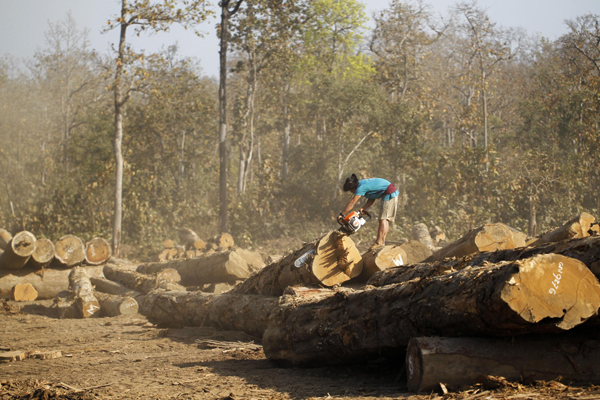Myanmar to ban log exports to save forests
|
A man uses a chain saw to cut teak logs in Sagaing, northern Myanmar, on March 5. Myanmar will ban the export of raw timber logs from April 1 choking off profits in a sector that provided critical funding to the country. Soe Zeya Tun / Reuters |
Myanmar has some of Asia's largest remaining expanses of forest, from the slopes of the Himalayan foothills in the north to steamy rainforests in the south.
But they have been disappearing fast.
Forest cover shrank almost one-fifth, to 47 percent of land area in 2010, from 58 percent in 1990, Forestry Ministry data show.
Total timber exports of 1.24 million cubic tons in the fiscal year to March 2013 brought in more than $1 billion in revenue, the figures show.
While timber remains an important income stream for Myanmar, it is not as critical as before.
To recognize Myanmar's political and economic reforms, the European Union, the United States and other countries have eased or lifted sanctions, allowing foreign investment in sectors such as telecommunications.
The reforms are now reaching into the forestry sector, with the government ready to put conservation above profit.
The ban is likely to hurt the forestry industry, which generates about 90 percent of export earnings from raw logs and not finished products, said Barber Cho, head of the Myanmar Timber Merchants' Association.
"Myanmar industry might suffer, some people might suffer," said Barber Cho, whose group represents about 900 companies.
"It's a difficult and complicated juncture for us."
Under the new rule, revenues could plummet, forcing forestry firms to invest in new sawmills to stay competitive.
But the action was necessary, as the nation's previous government had practiced "legal overproduction" that decimated Myanmar's forests for decades, Barber Cho said.
Forest products were the government's second most important source of legal foreign exchange and exports earned $428 million in the fiscal year to March 2005, natural resources watchdog group Global Witness said.
Among the big companies involved in the business are Asia World, the Htoo Group, and Yuzana Co, the two biggest palm oil companies in the environmentally sensitive southern region of Tanintharyi.
Yuzana also runs a 81,000-hectare biofuel concession in the world's largest tiger reserve in northern Kachin state, where the military has contracted with Asia World to build roads and dams, the conservation group Forest Trends said.
"All these renowned companies were granted associated rights over timber extraction in their project area," the Washington-based group said in a recent report.
The ban, covering all kinds of trees, will end Myanmar's status as the only country to export raw teak logs from natural forests rather than plantations. Exports of teak alone earned $359 million last year.
"Of course, this ban should have been imposed a long time ago, but it's better late than never," a forestry ministry official said.
"We believe it will help encourage the wood-based industry and increase job opportunities," the official said. He declined to be identified as he was not authorized to talk to media.
From next year, the government also plans to slash by 80 percent the amount of teak it allows to be taken from the forests, Barber Cho said.
Reuters



















